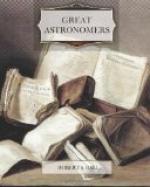“And though some former circumstances prevented me from applying to the person thus distinguished the sacred name of friend, I had the pleasure of doing justice...to his high intellectual merits...I believe he was not only gratified but touched, and may, perhaps, regard me in future with feelings more like those which I long to entertain towards him.”
Hamilton was in the habit, from time to time, of commencing the keeping of a journal, but it does not appear to have been systematically conducted. Whatever difficulties the biographer may have experienced from its imperfections and irregularities, seem to be amply compensated for by the practice which Hamilton had of preserving copies of his letters, and even of comparatively insignificant memoranda. In fact, the minuteness with which apparently trivial matters were often noted down appears almost whimsical. He frequently made a memorandum of the name of the person who carried a letter to the post, and of the hour in which it was despatched. On the other hand, the letters which he received were also carefully preserved in a mighty mass of manuscripts, with which his study was encumbered, and with which many other parts of the house were not unfrequently invaded. If a letter was laid aside for a few hours, it would become lost to view amid the seething mass of papers, though occasionally, to use his own expression, it might be seen “eddying” to the surface in some later disturbance.
The great volume of “Lectures on Quaternions” had been issued, and the author had received the honours which the completion of such a task would rightfully bring him. The publication of an immortal work does not, however, necessarily provide the means for paying the printer’s bill. The printing of so robust a volume was necessarily costly; and even if all the copies could be sold, which at the time did not seem very likely, they would hardly have met the inevitable expenses. The provision of the necessary funds was, therefore, a matter for consideration. The Board of Trinity College had already contributed 200 pounds to the printing, but yet another hundred was required. Even the discoverer of Quaternions found this a source of much anxiety. However, the board, urged by the representation of Humphrey Lloyd, now one of its members, and, as we have already seen, one of Hamilton’s staunchest friends, relieved him of all liability. We may here note that, notwithstanding the pension which Hamilton enjoyed in addition to the salary of his chair, he seems always to have been in some what straitened circumstances, or, to use his own words in one of his letters to De Morgan, “Though not an embarrassed man, I am anything rather than a rich one.” It appears that, notwithstanding the world-wide fame of Hamilton’s discoveries, the only profit in a pecuniary sense that he ever obtained from any of his works was by the sale of what he called his Icosian Game. Some enterprising publisher, on the urgent representations of one of Hamilton’s friends in London, bought the copyright of the Icosian Game for 25 pounds. Even this little speculation proved unfortunate for the purchaser, as the public could not be induced to take the necessary interest in the matter.




